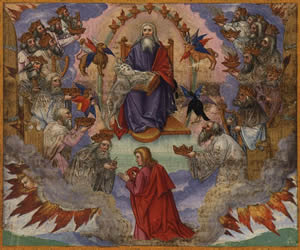33rd Sunday in Ordinary Time – Cycle B (Mk 13:24-32)

The Alpha and Omega
The readings today are apocalyptic, filled with visions of impending darkness, death, and destruction. It is important to place these events into the context of the times in order to understand their meaning. In the first reading, the prophet Daniel is describing a future of hope for those faithful Hebrews who have been the victims of wars waged by four kings. In the Gospel, often called the mini-apocalypse, Jesus tells his disciples that while there will be times of great distress, there will come a time when good will triumph over evil, God’s love will prevail, and Light will overcome darkness.From the dawn of time, man has waged war, fought one another, and treated others inhumanely. Throughout history there have been prophets and prophecies that proclaim the immediacy of impending doom. There are those who believe that the end is coming on December 21, 2012 because that is when the Mayan calendar ends. The head of a Christian broadcast group boldly predicted that the world would end September 1994. When that passed he claimed to have miscalculated and adjusted his prediction to occur on May 21, 2011.
While every age has its moments of distress and tribulations, we could certainly look at the world around us and conclude that we are living in a “time unsurpassed in distress.”
- A fifth of the world’s population lives in absolute poverty.
- Every three days more people die from malnutrition and disease than from the bombing of Hiroshima.
- Every year more people die from preventable hunger than died in the Holocaust.
- One out of every four human beings has no access to safe drinking water.
- There are somewhere between one billion and two billion unemployed adults in the world.
- More than half of the world’s adult population cannot read or write.
- More than half of the countries of the world have used violence against their own citizens in the form of torture, brutality, and summary executions.
- About 4 million people died in wars in the 18th century; about 8 million people died in wars in the 19th century; about 100 million people died in wars in the 20th century.
Seventy years ago, on November 10th, 1942, Winston Churchill stood before the House of Commons to declare a victory after a devastating series of defeats. He told them “We have a new experience. We have a victory … Now this is not the end. It is not even the beginning of the end, but it is, perhaps, the end of the beginning.”
Birth and death envelop all of life; birth is greeted with great joy, death with fear and sorrow. Yet we profess and believe in the resurrection of the body and life everlasting, certainly a time of anticipation and a cause for celebration. Perhaps we should look at the end of life as another beginning, the end of the beginning which was our birth, the first step into eternity.
How we journey through life is important for it will determine where we shall begin at the end. Of the end of the beginning, Jesus tells us “But of that day or hour, no one knows, neither the angels in heaven, nor the Son, but only the Father.” We must live our lives as if it is our last, not in fear but in peace and with the grace of God.
No one knows. For some the end arrives almost before life has begun; for others the end is long delayed. For my parents, life ended in an instant, when they were killed in a traffic accident; they were 59 and 58 years old at the time, with two children still in school. They had every expectation that they would live for many years to come, but God had other plans for them. I have no doubt my parents were prepared for the end of the beginning because I know how they lived their lives, devoted to their God.
A few weeks ago, my cousin’s husband passed away after a lengthy battle with cancer. He was one of a few who had the opportunity to prepare for his death, to say farewell to family and friends, and to offer his life up to God. He lived far longer than his doctors predicted; he asked God for a cure but admitted that it was His will not his. Even though he saw the end coming, he never knew when he would draw his last breath.
It is absolutely essential that we live every moment of our lives for the praise and glory of God. At our birth, each of us is given an invitation from God. God has invited us to His banquet and we must be prepared for the moment when it is ready and He asks us to come home.
Since we know
neither the hour
nor the day,
let this be the hour,
let this be the day,
let this be the time
that we begin and end.
